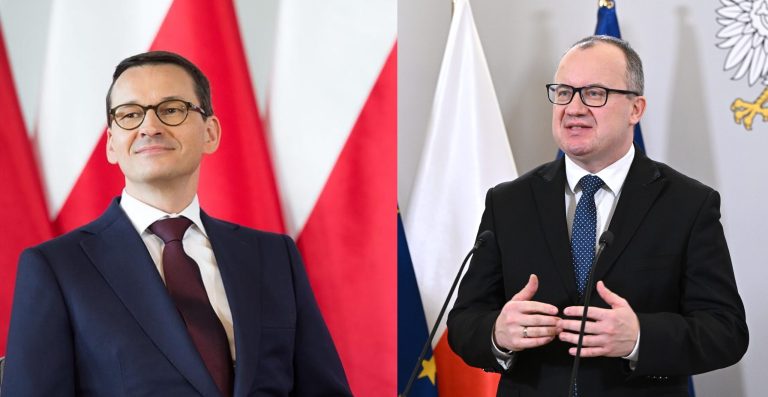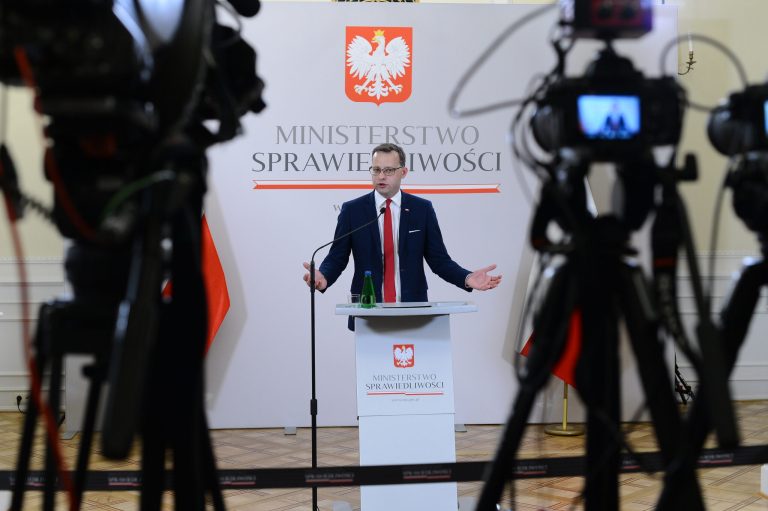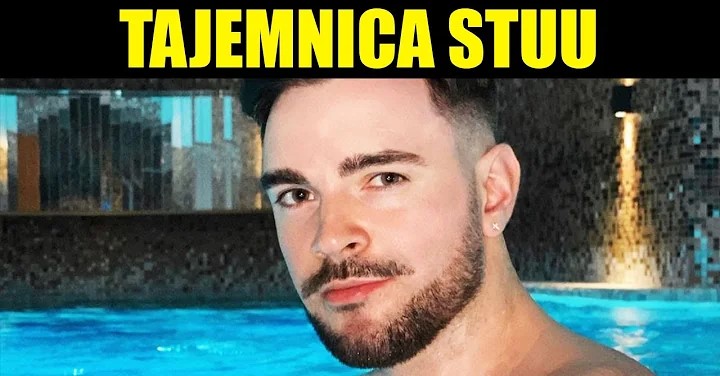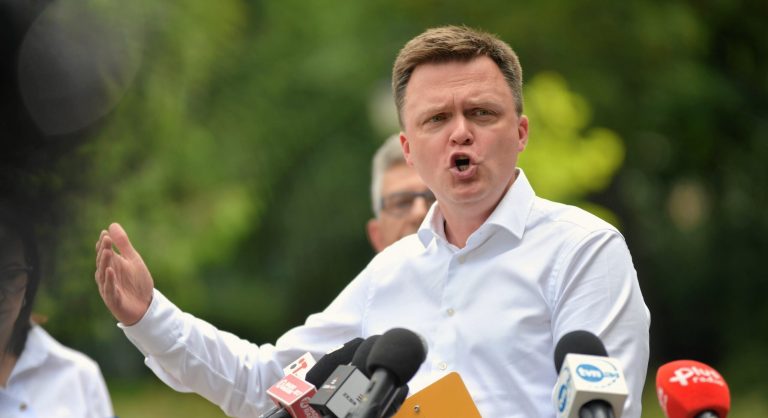What is at stake in the dispute over Polish state-owned media?
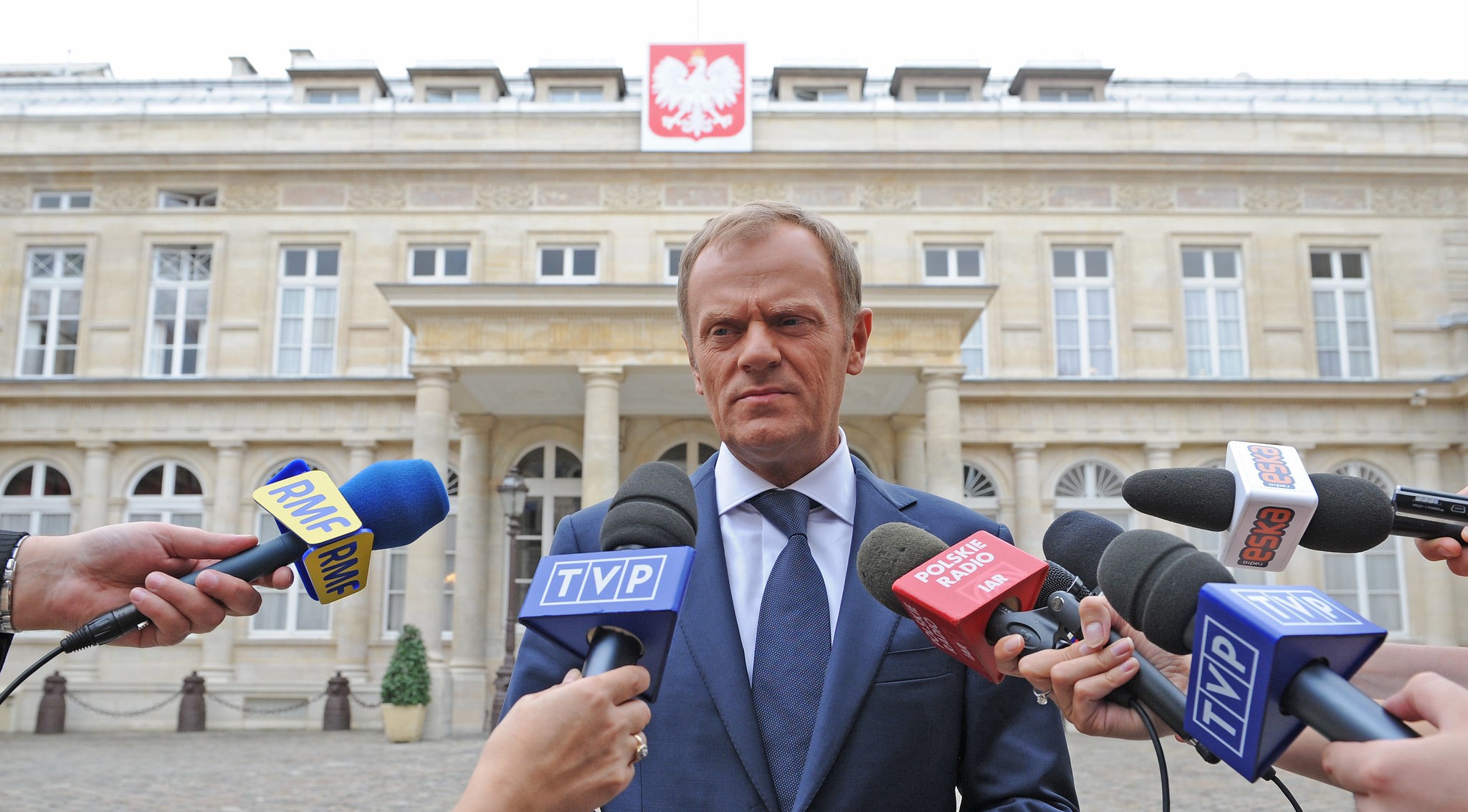
By Aleks Szczerbiak
The dispute over Poland’s state-owned media has shown how problematic the new government’s project of elite replacement can be where legislation is required to shorten its predecessor’s appointees’ terms of office. Get-arounds that avoid possible presidential vetoes leave it open to accusations that it is undermining democracy and violating the “rule of law”.
Sacking state media managers
In the week leading up to Christmas, Poland’s culture minister Bartłomiej Sienkiewicz sacked the management of the TVP state television company, Polish Radio and the state-owned Polish Press Agency (PAP), together with their supervisory boards, and replaced them with his own nominees.
He also switched off the broadcast feed for the TVP Info 24-hour news channel. Sienkiewicz is a member of the liberal-centrist Civic Platform (PO), the largest grouping in the new coalition government which took office in mid-December and is headed up by the party’s leader Donald Tusk, who was previously Polish prime minister between 2007-14.
Poland’s new government has dismissed the heads of public media outlets and this morning state TV’s news channel went off air.
That prompted a sit-in protest by the former ruling party at TVP headquarters in defence of „media independence and pluralism” https://t.co/YSTbQc6Q65
— Notes from Poland 🇵🇱 (@notesfrompoland) December 20, 2023
Polish President Andrzej Duda – who is an ally of the right-wing Law and Justice (PiS) party, which lost power after eight years in office following its defeat in last October’s parliamentary election – condemned the new government’s move as unconstitutional and a flagrant violation of the principles of the “rule of law’”.
Immediately after Christmas, he refused to sign into law a budget-related spending bill which included 3 billion złoty of funding for the state-owned media; the government lacks the three-fifths parliamentary majority required to overturn a presidential veto.
When the new government originally announced its spending plans they did not include funding for the state-owned media – which, at that time, were still effectively under the influence of PiS-backed nominees – but, following the culture minister’s dramatic moves, the funds were reinstated.
Sienkiewicz responded by putting the three state-owned media companies into insolvency and appointing liquidators to take over their day-to-day running.
Poland’s government has put public broadcasters TVP and Polskie Radio as well as the Polish Press Agency (PAP) into liquidation.
It says it was forced into the unprecedented decision due to the president’s veto of funding for public media https://t.co/UvwfC4tfvb
— Notes from Poland 🇵🇱 (@notesfrompoland) December 27, 2023
Politicisation or pluralism?
“De-politicising” Polish state-owned media outlets was one of the new ruling parties’ main election pledges.
They argued that, during PiS’s period in office, the taxpayer-funded media outlets, especially TVP’s news and current affairs programmes, had violated their statutory duty to provide services that were pluralistic and impartial, turning the state-owned broadcasters into crude ruling party propaganda channels.
They said that this point had been made repeatedly by international bodies such as the Organisation for Security and Co-operation in Europe (OSCE) election monitoring missions, while the CBOS polling agency found that public trust in state TV’s news output had fallen to its lowest ever levels.
A prominent figure from state TV admits they produced „worse propaganda” than under communism to support the ruling party’s election campaign.
But he thinks this „Stalinist logic” backfired and contributed to the negative outcome of the election for PiS https://t.co/8CsLIeVgNz
— Notes from Poland 🇵🇱 (@notesfrompoland) October 18, 2023
However, PiS supporters argued that the state-owned media helped to bring greater pluralism and balance to a media landscape otherwise dominated by the liberal left. They said that Polish governments had always sought to influence state-owned media and there was also political bias under previous managements.
PiS argued that, for example, before its 2015 changes to the state-owned media, all three main Polish evening news bulletins had (to a greater or lesser extent) an anti-conservative bias. Some PiS supporters acknowledged that after 2015 the pro-government bias became more blatant (and, therefore, arguably actually less effective).
However, others argued that state-owned media needed to offer Poles a powerful counter-narrative to provide balance when privately owned outlets were so overwhelmingly anti-PiS.
Getting around the presidential veto
Nonetheless, even some of the new government’s supporters were frustrated that it did not appear to have any broader plan beyond closing down TVP Info and firing state-owned media’s management and leading journalists.
There was also a fierce dispute about the legality and constitutionality of Sienkiewicz’s actions. Indeed, the government’s critics did not just include PiS, but also a number of legal experts and bodies such as the Helsinki Foundation for Human Rights that had been highly critical of the previous administration’s approach to the “rule of law”.
The new government’s takeover of public media prompted protests from the former ruling PiS party. But it also raised doubts among legal experts.
We asked three such experts – @K_Izdebski, @MichaRomanows14 and Dominika Bychawska-Siniarska – for their views https://t.co/u9QAMFX2Zk
— Notes from Poland 🇵🇱 (@notesfrompoland) December 26, 2023
For its part, PiS argued that the statutory body responsible for appointing and dismissing the management of state-owned media was the National Media Council (RMN), whose term of office runs until 2028. If the new government wanted to change the legal rules for appointing state media authorities then it needed to amend the media law (as PiS did when it sacked the then-state broadcasting management boards in 2015).
PiS also accused the new government of acting in contravention of a so-called “safeguard order” issued by the Polish Constitutional Tribunal in December obliging it to refrain from making any changes to state-owned media management.
However, because of the risk of a presidential veto (Duda remains in office until summer 2025), the new government did not follow the legislative route. Instead, it pushed through a parliamentary resolution calling for decisive corrective action to restore the proper functioning of state-owned media.
This cited a December 2016 Constitutional Tribunal ruling that found fault with aspects of the PiS government’s 2015 takeover of state-owned media, specifically that only the National Broadcasting Council (KRRiT), and not a government minister, could appoint their management boards.
The constitutional court has issued an order preventing Poland’s new government from making changes to public broadcasters.
The incoming coalition has pledged to overhaul state media, which were turned into a mouthpiece for the former ruling PiS party https://t.co/cTyG3SW4UP
— Notes from Poland 🇵🇱 (@notesfrompoland) December 15, 2023
The government argued that, as the 2016 ruling was never implemented, the provisions of the law establishing the National Media Council had no binding force and this empowered Sienkiewicz (as the legal representative of the state treasury, the companies’ sole shareholder) to use the powers of commercial law to remove the existing management and supervisory boards and appoint new ones.
In other words, it said that Sienkiewicz was correct to proceed in this way because PiS’s earlier actions were themselves illegal, or at least unconstitutional. The government also argued that the Constitutional Tribunal’s December “protective order” had no legal validity because one of the members who issued the ruling had been appointed inappropriately.
Sienkiewicz changes tactics
The government’s critics responded that, even if the provisions of the act that empowered the National Media Council to appoint and dismiss public media managers appeared to conflict implicitly with the 2016 ruling, the Constitutional Tribunal did not declare explicitly that the council was unconstitutional because it was not considering directly the legislation empowering it.
As noted above, it was examining earlier legislation passed when PiS originally took control of the state-owned media at the end of 2015. This meant that the provisions of the law empowering the National Media Council were still operative.
The government’s supporters invoked the concept of “secondary unconstitutionality”, arguing that the tribunal ruling implied that the law transferring appointment powers to the National Media Council had no biding force because it violated the same constitutional standards as the one that it ruled unconstitutional in 2016.
The government’s critics, in turn, responded that, even if one accepted that the correct legal interpretation of the tribunal ruling was that the National Media Council could not appoint these management boards, then these powers should pass to the National Broadcasting Council (which currently has a majority of PiS nominees) as the constitutionally designated body, and not a government minister.
The constitutional court has issued an order preventing Poland’s new government from making changes to public broadcasters.
The incoming coalition has pledged to overhaul state media, which were turned into a mouthpiece for the former ruling PiS party https://t.co/cTyG3SW4UP
— Notes from Poland 🇵🇱 (@notesfrompoland) December 15, 2023
Moreover, they pointed out that when the current governing parties were in opposition to PiS, they themselves argued that ministers directly appointing state-owned media management bodies was illegal and unconstitutional.
Indeed, some commentators argued that Sienkiewicz decided to put the state media companies into insolvency because he was not confident that the National Court Register (KRS), the body responsible for validating changes to the company boards, would confirm his new appointments. By appointing liquidators instead he was felt to have a much stronger legal case.
However, even those commentators who felt that the culture minister was legally empowered to appoint liquidators, bypassing both the National Media Council and National Broadcasting Council, pointed out that they only have very limited powers relating strictly to preparing the businesses for liquidation. All of this further complicated an already complex and contested legal situation.
The ends justify the means?
Some government supporters use a “transitional justice” logic to justify its actions: that constitutional safeguards can (indeed, should) sometimes be ignored when taking steps to restore legal order to institutions that have been corrupted and whose legitimacy is questionable.
In other words, that restoring democracy and the “rule of law” sometimes requires undemocratic and unlawful (or questionably democratic and lawful) means.
Polish deputy culture minister on the govt’s takeover of public media:
„When you’re cleaning something, sometimes you get dirty, but then you take a shower”
Asked if she’s saying the ends justify the means:
„Sometimes you have to say that” https://t.co/MG69LXNXqa
— Daniel Tilles (@danieltilles1) December 28, 2023
However, even if one accepts this analysis of the nature of PiS’s media reforms (which, as noted above, is strongly contested by the party’s supporters) this kind of “democratic coup” framing arguably uses the same (its critics argue, legally and constitutionally questionable) logic that the previous ruling party’s supporters applied to justify its own systemic reforms and elite replacement policies.
These, they argued, were necessary to repair the flawed institutions and elites that emerged following Poland’s distorted post-1989 transition to democracy.
Some commentators also argue that even if the takeover of the state media companies was dubious (or even unlawful), it should ultimately be judged on whether it manages to establish more pluralistic and objective media outlets.
However, the government’s critics argue that not only is this once again simply replicating the “ends-justify-the-means” logic that the current governing parties previously accused PiS of, but that the ruling camp has not actually presented any plan or vision of how the state media will be “de-politicised”.
The early indications were, they argued, that “de-politicisation” simply meant changing its management to one that is more sympathetic to the new government, with the previous crude bias being replaced by a softer, more subtle one.
Further polarisation of the political scene
The dispute over state-owned media further polarises an already bitterly divided Polish political scene. The government appears to have calculated that it was worth taking certain risks to give its most radical core supporters, who intensely disliked state media’s political output and wanted decisive action, a sense of moral victory and satisfaction that some kind of reckoning with PiS’s legacy was finally taking place.
For PiS, although the protests in and around the state media offices mainly involved parliamentary deputies and leading figures from the companies’ old guard, the notion that they are, as they put it, defending a free and plural media against an illegal and unconstitutional takeover provides the party and its supporters with a new rallying message.
Opposition leader Jarosław Kaczyński spent New Year’s Eve in the offices of state broadcaster TVP’s news agency, where politicians from his former ruling PiS party have been protesting against the new government’s takeover of public media https://t.co/ayM5X6wAxp
— Notes from Poland 🇵🇱 (@notesfrompoland) January 1, 2024
On the other hand, the manner of the state media takeover puts PO’s junior coalition partner – the eclectic liberal- and agrarian-centrist “Third Way” (Trzecia Droga), which appeared to offer, to some extent at least, a break with the polarising logic of Polish politics – in a more awkward position.
There is also, of course, a risk that the spectacle of occupied buildings and switching off television signals could disconcert some moderate government supporters who might be concerned that once the rules have been bent (some would say broken) it becomes tempting to continue to do so, perhaps even more blatantly.
On the other hand, forcing the Third Way to defend – and, therefore, be implicated in – such controversial actions may, ironically, actually end up binding them more closely to the governing coalition.
Elite replacement is problematic
The new government’s moves to change state-owned media management have set off a legal and political firestorm that is unlikely to settle down in the coming weeks, not least because it is part of its broader project of elite replacement.
The unpicking of PiS’s judicial appointments and reforms is likely to be the next battleground in this conflict. The dispute over the state-owned media has shown how problematic this could be if legislation is required to shorten the previous government’s appointees’ terms of office.
It will be even more difficult when, like judges, these appointees have constitutionally protected terms of office. Further get-arounds to avoid possible presidential vetoes will once again leave the new administration open to accusations that it is guilty of the same undermining of democracy and “rule of law” of which it accused its predecessor.
Yesterday’s chaotic takeover of public media highlights the difficulty Poland’s new government faces in repairing captured public institutions without resorting to the same dubious methods that degraded them in the first place, writes @StanleySBill https://t.co/G0OA8OOZZg
— Notes from Poland 🇵🇱 (@notesfrompoland) December 21, 2023
Notes from Poland is run by a small editorial team and published by an independent, non-profit foundation that is funded through donations from our readers. We cannot do what we do without your support.
Main image credit: Grzegorz Rogiński/KPRM (under CC BY-NC-ND 2.0)

Aleks Szczerbiak is Professor of Politics at the University of Sussex. The original version of this article appeared here.

